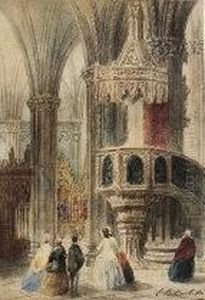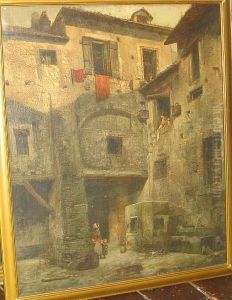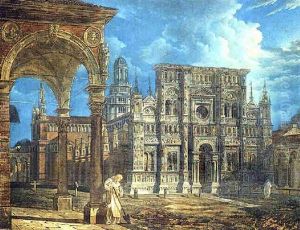Luigi Bettinelli Paintings
Luigi Bettinelli was an Italian Jesuit priest, writer, poet, and literary critic who lived during the Enlightenment period. Born on August 18, 1716, in Mantua, Italy, he became a prominent figure in the Italian literary scene of the 18th century. Although not primarily known as a visual artist, his contributions to the arts and humanities were significant through his critical essays, poetry, and pedagogical efforts.
Bettinelli entered the Society of Jesus in 1732 and was educated in the Jesuit colleges of Brescia, Parma, and Milan, where he studied humanities, philosophy, and theology. He was ordained as a priest in 1740. Bettinelli was a well-traveled man, visiting various parts of Italy and other European countries, which enriched his cultural and intellectual perspectives.
As an educator, Bettinelli taught rhetoric in Brescia and Parma, and later he held the chair of eloquence at the University of Mantua. His teaching career was marked by his advocacy for the modernization of education, emphasizing the importance of engaging with contemporary culture and literature. Bettinelli's ideas on education and the role of literature in society were progressive for his time and influenced his students and contemporaries.
Bettinelli's literary output includes a variety of genres, such as poetry, drama, and essays. His work often reflected his Jesuit background and his commitment to the ideals of the Enlightenment. He is perhaps best remembered for his critical work, 'Dell'entusiasmo delle belle arti' (On the Enthusiasm for the Fine Arts), published in 1769, in which he discusses the emotional impact of art and the sublime.
Throughout his career, Bettinelli engaged in literary controversies, most notably with the famous French philosopher Voltaire. Bettinelli criticized Voltaire's works and the negative influence he perceived them to have on public morals and religion. This back-and-forth with one of the Enlightenment's key figures further cemented Bettinelli's reputation as a significant intellectual of his era.
Luigi Bettinelli died on September 13, 1782, in Mantua, leaving behind a legacy as an educator and a man of letters who played a part in shaping the discourse of the Enlightenment in Italy. His works continued to be studied and appreciated for their contribution to literary criticism and pedagogy.


